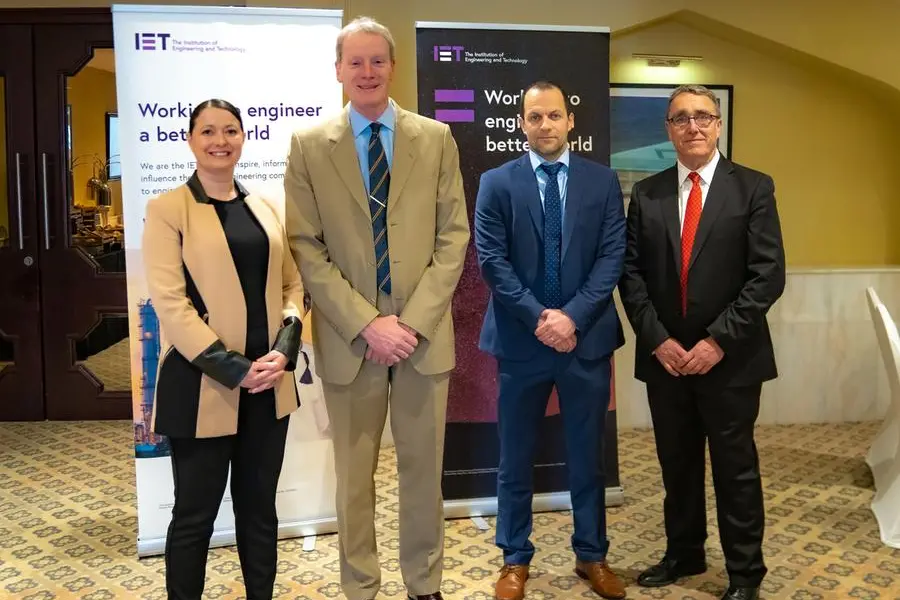PHOTO
The engineering sector must work closer with academia if the Sultanate of Oman is to inspire and enable the next generation to become world-class innovators, a fundamental component of Oman Vision 2040, a new report reveals.
The Institution of Engineering and Technology (IET), a 152-year-old global organisation with 154,000 members in 148 countries, has released findings from its Oman Skills Survey that lays bare the skills gap currently facing the Omani engineering industry, as well as the skills prospects for the next decade that will be vital in maximising the country’s engineering potential and diversifying the economy.
The IET, which has been running skills surveys for the past 18 years, joined forces with market researchers YouGov, and interviewed individuals in Oman with management responsibilities in companies that employ engineers.
The findings cast a positive light on the expansion of the industry, with two thirds (66%) reporting an increase in staff numbers over the past year. However, in the last 12 months almost all (97%) struggled to recruit with problems centred on applicants’ lack of skills, experience, or qualifications.
And skills aren’t the only barrier with over a third (37%) of respondents reporting a lack of diversity within their workforce as a current challenge – something they still expect to be prevalent in three years’ time (32%).
Over the next two decades, Oman has put education and learning as key priorities of Oman Vision 2040, with targets to move Omani universities up the global rankings index (into the top 300) and to move into the top 20 countries in the Global Talent Competitiveness Index. A large share of organisations who employ university graduates believe they have the skills to address the challenges their organisation faces (88%).
However, there are still barriers to encourage young Omanis into choosing engineering as a career with half thinking young people lack knowledge about different career options within engineering (49%) and the absence of available job opportunities (47%).
Artificial Intelligence and Machine Learning are considered an important area of skills growth over the next five years, although a third of firms (33%) don’t have or don’t know if they have the right skills in this area.
Sir Julian Young, the IET’s Immediate Past President, said: “The Sultanate of Oman has clear long-term ambitions that support an economic diversification away from oil dependence. With priorities including modernising the education system and building capabilities at a local level, it is clear from our research that there needs to be a re-focus on upskilling, including better collaboration between higher education institutions and industry to provide real-world applications to learning and ensure engineering education is aligned to current and future industry needs.
“For Oman to continue to build home-grown engineering talent to meet its future requirements, industry and the Government will need to work with schools to ensure children from a young age experience more hands-on practical learning of STEM (Science, Technology, Engineering and Maths) subjects to encourage creativity, imagination and problem solving. This should be a continual dialogue and can be supported by collaborative projects and student work experience schemes as young people progress through the education system.
“In order to then advance within a global market, higher education organisations should seek accreditation from reputable international bodies and form more partnerships with international institutions. This will support future global mobility of engineers and in turn vastly increase diversification within Oman’s engineering and technology industries.”
Dr Laura Norton, the IET’s Head of Equality, Diversity and Inclusion, added: “To achieve its long-term goals, Oman needs to diversify its economy. Successful diversification requires new knowledge, relevant skills and innovation. To access the best skills and knowledge, and to ensure engineering outputs are for all of society, it is important to harness a wide source of talent, yet 37% of managers in our survey think that lack of diversity in the workforce is an issue.
“We recommend that organisations champion multiple areas of diversity in their workforce. This will give access to a greater breadth of knowledge, skills and experience, ensuring the engineering workforce reaches its full potential. In turn, this will support diversification and growth and will help address the ongoing skills shortages seen across the globe.”
The IET-led survey also uncovered the rise in prominence of the IT and communications as the most important industry in Oman over the next three years (55%) and longer term (51%).
This has identified a clear training priority over the next five years, although most employers are confident, they can address the skills gap as their businesses diversify into new areas. There is a high degree of certainty that organisations, which identified a need, will be able to access the training required (94%), with the majority looking to professional training bodies (60%).
The research shows that the top ways for Omani engineers to increase their credibility are by completing additional qualifications (43% of those surveyed agreed) and by completing an accredited apprenticeship programme (41%). Registration with a national body (36%) and membership of an international professional body (34%) help too.
Sir Julian Young, added: “Investment in staff development is crucial for long-term growth, even if the benefits are not immediately tangible. It is important that organisations identify the future skills they will need and make sure that training is aligned accordingly.
“Engineering employers can gain value by encouraging the achievement of professional standards within their workforce. There are globally-recognised frameworks that exist to assess the professionalism of engineers and technicians. The attainment of such standards boosts the level of knowledge, skills and competence, and also supports ethical behaviour in the workforce.
“This supports the recent move by the Ministry of Labour in launching its mandatory accreditation system for engineers in cooperation with the Oman Society of Engineers. We recommend that this is in line with internationally recognised competency-based frameworks - a move that would provide regulatory benefits and international mobility, while also increasing the quality of engineers.”
The IET has developed action areas for government, practitioners, industry and academia that build on strengthening collaboration, embedding practical work experience, skills development, professional registration and diversification.
Read these, and wider survey findings, in more detail in the IET Oman Engineering and Technology Skills Report, available via the IET’s website.
-Ends-
The sample was drawn from trusted partners in Oman and only those with management responsibility in an organisation which employs engineers were allowed to take part. In total there were 244 respondents with a spread across organisation size, work sector, and time spent in their industry.
The results are not weighted so are not representative of the population. The report findings represent the views of survey respondents only. All fieldwork was carried out online between 20 December 2022 and 3 January 2023.
About the IET
The Institution of Engineering and Technology (IET) inspires, informs and influences the global engineering and technology community to engineer a better world. Founded in 1871, we are one of the world’s oldest professional institutions. We are also one of the largest, with 154,000 engineering and technology professionals in 148 countries. We have operated under a Royal Charter for more than 100 years.
We are a diverse home for engineering and technology intelligence throughout the world. This breadth and depth means we are uniquely placed to help the sector progress society.
We use our influence, knowledge, and expertise throughout the globe to champion the role engineering and technology plays in the future of our society and our planet.
As well as supporting and developing engineers throughout all stages of their career, we influence industry to embed engineering excellence and professionalism into everything they do.
We are trusted to develop and share impartial knowledge that advises and supports the advancement of engineering related policy, and we help wider society better understand some of the most pressing global engineering challenges such as climate change.
As a registered charity, we strive to inspire the next generation to embark on a career in engineering and technology, change outdated perceptions and tackle skills gaps. This includes encouraging more women to become engineers and growing the number of engineering apprentices. We do this through a range of educational programmes and public relations and engagement campaigns.
Interview opportunities are available with our spokespeople from a range of engineering and technology disciplines including cyber-security, energy, engineering skills, innovation, manufacturing, technology, transport and diversity in engineering.
For more information, visit www.theiet.org
Contacts
UK press office
Hannah Kellett
Head of Operational Communications
hkellet@theiet.org
Rebecca Gillick
External Communications Manager
rgillick@theiet.org




















